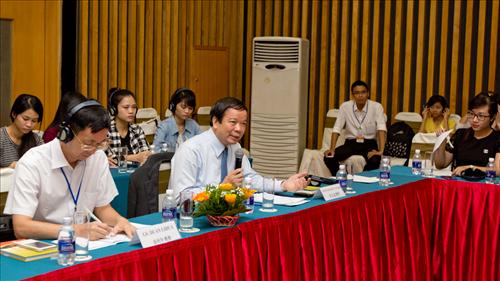
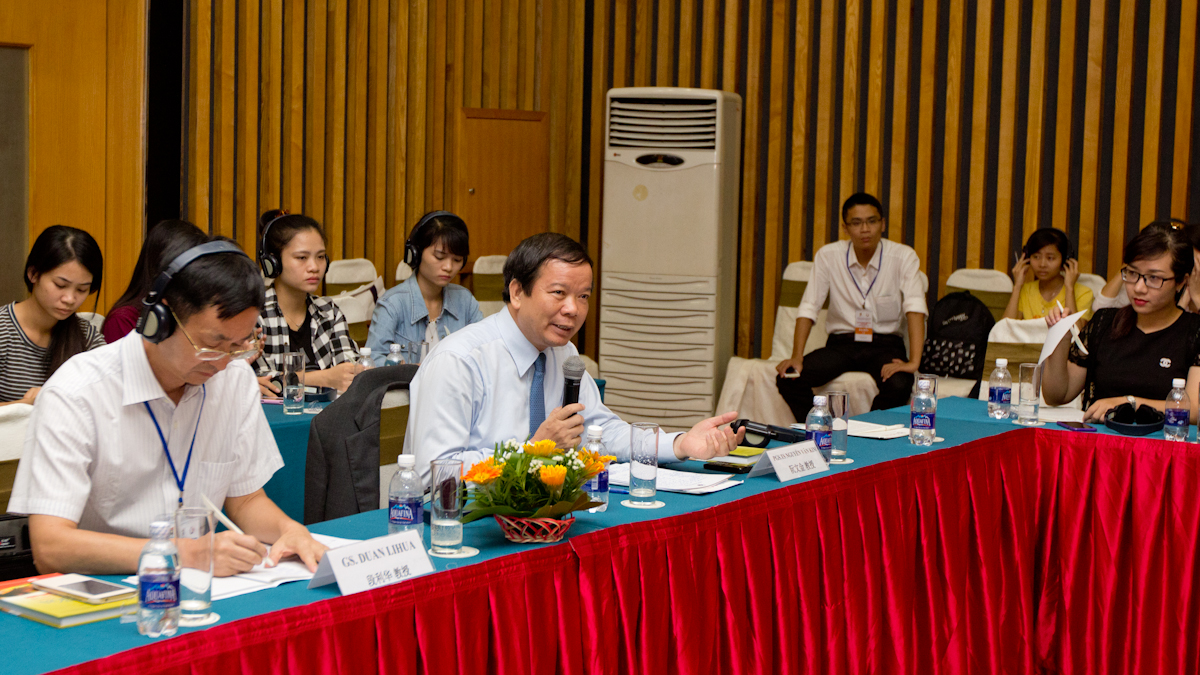
Associate Professor Dr. Nguyen Van Kim - Party Committee Secretary, Vice Rector of the University of Social Sciences and Humanities, VNU (speaking) and Professor Doan Loi Hoa, Vice Rector of Dali University, is chairing the first discussion session.
The Red River basin area is about 169,000 km2 In which, Vietnam has the largest area of 87,840 km2, China is second with about 81,200 km2 and the Upper Laos region is 1,100 km2. In recent years, the education policy between Vietnam and China has many advantages. In February 1993, the minutes of the talks on Vietnam - China educational cooperation were signed. By 1996, the two countries had an agreement on strengthening cooperation in the field of education and training for the period 1997-2000. By April 18, 200, the two countries continued to have agreements on exchange and cooperation for the period 2001-2004. In 2009, the two countries had an agreement on the recognition of equivalent university degrees. This is an important legal basis for universities in the Red River basin to promote cooperation in training high-quality human resources and scientific research cooperation.
Cultural, sports and tourism exchanges have also been expanded. The two countries have strengthened cooperation in the fields of cultural industry and human resources. Every year, the two sides exchange many art troupes and organize many cultural and sports exchanges. Effectively implement the agreement on sports cooperation. Actively promote the establishment of cultural centers of one country in the other.
In addition, economic and trade cooperation between Vietnam and China has an increasing proportion. In 2012, the total import-export turnover between Vietnam and China reached 40 billion USD. By 2013, it was 49.9 billion USD, an increase of 21.1%. Investment relations between Vietnam and China have many developments. Chinese FDI in Vietnam reached 2.3 billion USD. Particularly in the Yunnan region, economic and trade cooperation with northern Vietnam has also developed strongly. This is reflected through many specific activities such as organizing the Yunnan - Vietnam economic forum; the Kim Thanh - Lao Cai transnational economic cooperation zone with Hekou - Hong Ha.
The geographical, economic, cultural and social conditions have created a demand for cooperation in training high-quality human resources for universities in the Red River basin. Currently, China also provides about 130 long-term scholarships for Vietnamese students every year. Vietnam has about 13,500 students studying in China and vice versa, China also has about 3,500 international students in Vietnam. Of which, Yunnan province alone has about 2,000 Vietnamese international students, accounting for about 1/3 of the total number of international students here.
Training high-quality human resources to serve international integration
The introductory report with the theme "Cooperation in human resource training among schools in the Red River basin" has put forward many important proposals and solutions in the orientation of training high-quality human resources among schools in the Red River basin such as: student and lecturer exchange; short-term training 1+3, 1+4; 2+2 training; postgraduate training.
Regarding student and scholar exchange activities, schools can recognize course credits to enhance student exchange between schools of the same major or in related fields. Increase sending scholars to schools to teach and conduct research to exchange knowledge and professional expertise.
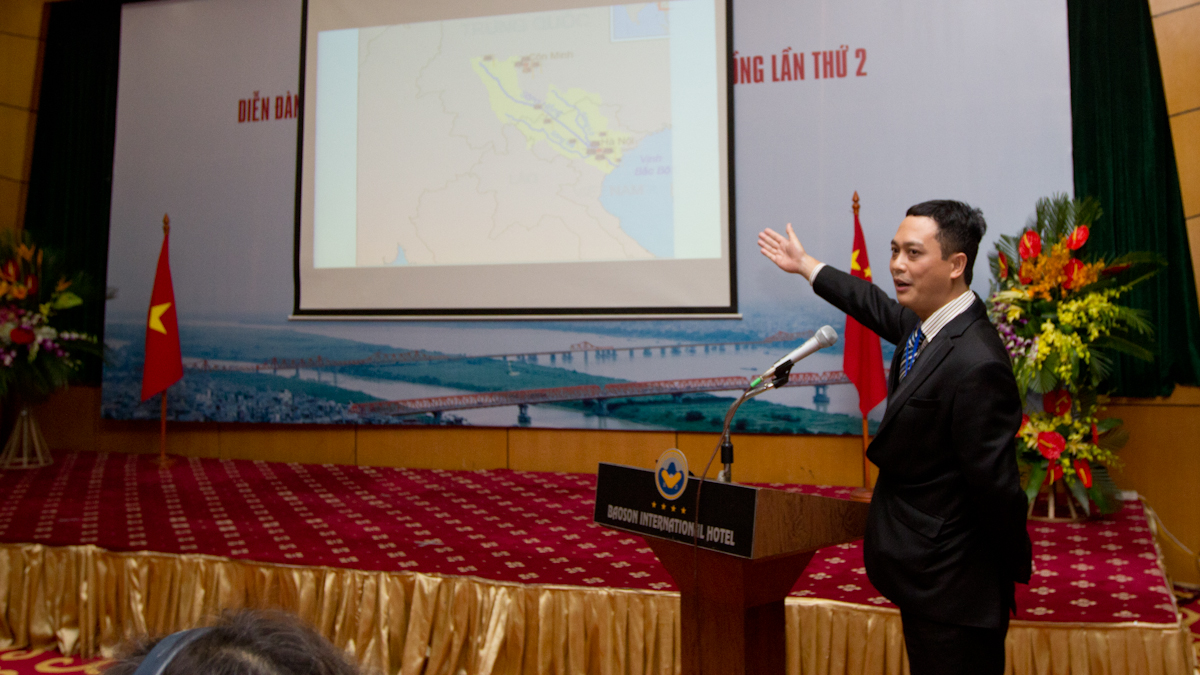
Associate Professor, Dr. Nguyen Van Hieu (University of Social Sciences and Humanities) is presenting the introductory report with the topic "Cooperation in training high-quality human resources to serve integration"
In the 1+4 cooperation form, students study the language for the first year at the host school and then transfer to the host country's school to study the university program. Or study the language for 3 years at the host school and 1 year of internship to improve language proficiency in the host country in the 1+3 form. Or implement short-term training programs in the summer and winter for about 2 to 6 weeks. Students can study specialized subjects and can experience life and culture in different localities.
With the 2+2 training format, students have 2 years to study foreign languages and basic subjects in the country to gain a basic amount of knowledge. The remaining 2 years, students study their major and do internships at universities in China or Vietnam. The degree is granted by one party or can be in the form of joint degrees. Implementing training in this format will help students reduce many costs of studying and living.
The newspaper also pointed out some difficulties in training cooperation between schools in the Red River basin such as limited information about the majors among member schools; language barriers are also a big difficulty; training programs in majors, especially for social sciences and humanities, are not really flexible; facilities of schools are not really uniform. These are barriers in the process of promoting high-quality training cooperation of universities in the Red River basin.
During the discussion, in general, universities in the Red River basin agreed on the direction of increasing cooperation in the field of training. Specifically, applying training forms 2+2, 1+3, 1+4 to suit the majors and majors of each school. In addition, the Principals of the schools also agreed on increasing exchanges between lecturers and students, cultural, sports and entertainment activities to strengthen solidarity and promote educational cooperation. Because culture is one of the shortest connecting paths.
With experience in cooperating with more than 20 universities in China, Mr. Pham Van Cuong (Principal of Hai Phong University) suggested that "Schools should increase leadership exchanges in addition to lecturer and student exchanges. Direct visits will promote faster and deeper cooperation decisions."
The President of the University of Culture added, "We should organize meetings more frequently in the two fields of training and cooperation. Specifically, leaders of training departments and leaders of international cooperation departments need to regularly exchange and meet with each other to have multi-dimensional information. From there, many proposals and advice can be made to the Board of Directors.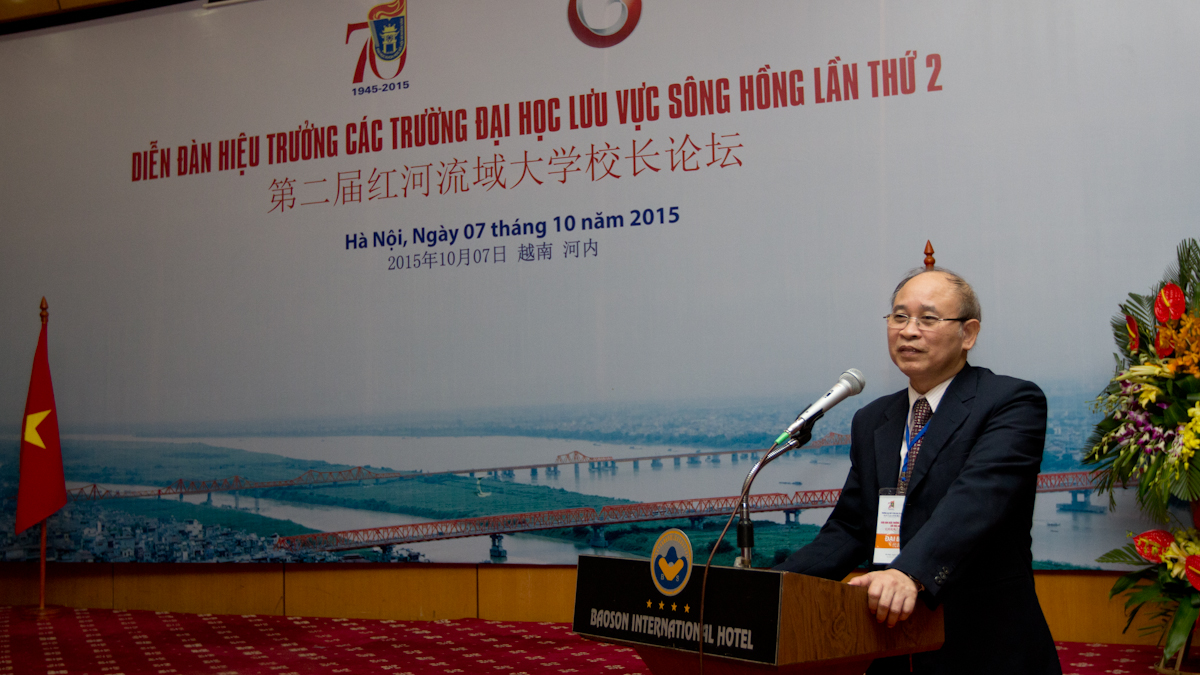
Mr. Pham Nhu Cuong - Principal of Hai Phong University is speaking at the forum.
Each school has its own strengths, along with its own characteristics and unique, non-overlapping cultures. Therefore, schools can promote their own strengths, integrate into the common region, create a cross-national playground, and build a strong community. Taking the main theme of exchange and enhancing cooperation in training exchange is the key orientation. Only then can we create strong steps in creating a high-quality team, said the Vice President of Kunming University.
In addition, some other solutions such as tuition support to reduce the difference in training costs between schools in the two countries; promoting the effective operation of the forum secretariat; building a good information data system between schools in the forum.
Scientific research cooperation to serve regional development
In addition to promoting cooperation in training high-quality human resources, the work of promoting scientific research cooperation to serve regional development also plays a very important role. Currently, the Hong River basin in particular and the world in general are facing many global issues that require the joint efforts of many countries and ethnic groups, such as climate change, sustainable development, cultural exchange, etc.
Through research cooperation, improving research capacity will help schools train high-quality human resources, create good scientific products, have an impact on the whole society, internationally, and strengthen friendly cooperation between the two countries and two connected territories in the Red River basin. All of these goals, in the end, aim to contribute value to the development of the country in particular and the world in general.
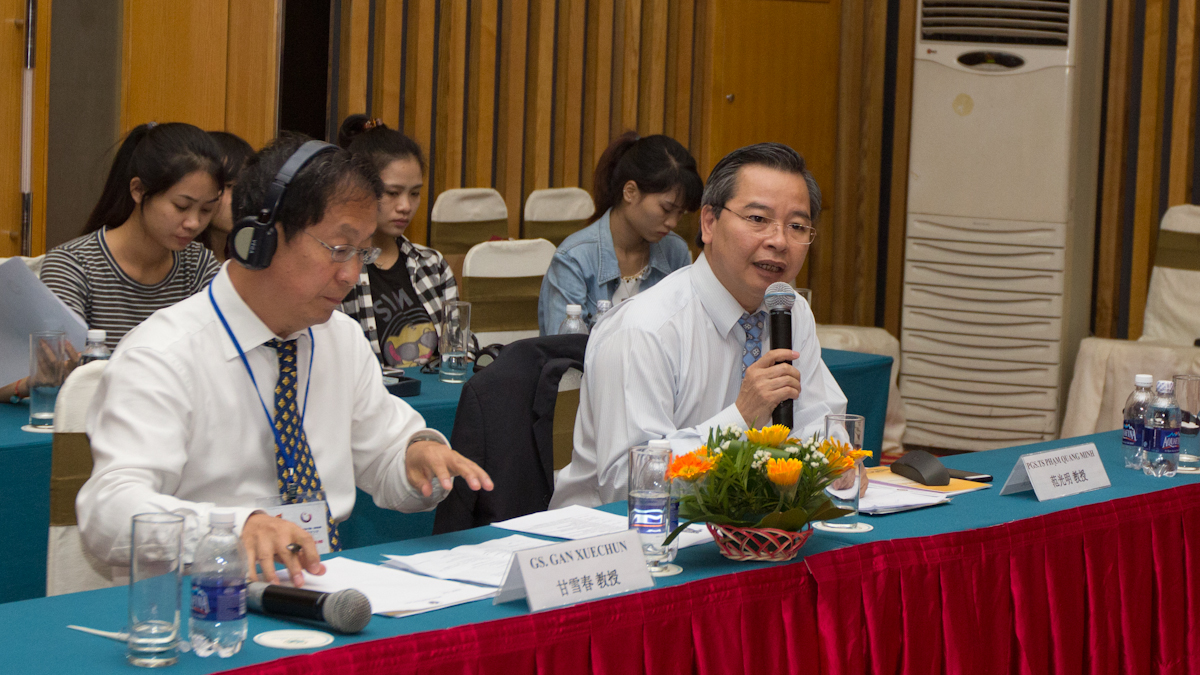
Associate Professor Dr. Pham Quang Minh - Vice Rector of the University of Social Sciences and Humanities, VNU (speaking) and Professor Cam Tuyet Xuyen - Rector of Hong Ha Academy is chairing the second discussion session.
During the discussion, the school leaders pointed out a number of topics that universities in the basin could be interested in and discuss not only in today's forum, but could also be a cross-cutting topic in the following forums such as the topic of sustainable development - this is a highly interdisciplinary topic; issues related to culture, tourism, ethnicity; urbanization, modernization; tourism and cultural development issues...
The leaders of Hai Phong University made two suggestions for future research cooperation: focusing on topics to promote exchanges in the Yunnan - Hai Phong economic corridor; developing cultural and tourism activities in the corridor of Yunnan provinces and the northern provinces of Vietnam.
Dali University believes that there are 5 directions that can be researched in the near future: ecological environment, agricultural activities, pharmaceuticals, ethnic culture and tourism culture. The President of Dali University also proposed that schools can cooperate to research on a topic. In which the topics are closely linked to the activities of the localities to be able to take advantage of financial budgets. In addition, it is necessary to promote information exchange and academic exchanges, contributing to improving the research capacity of the scientific team.
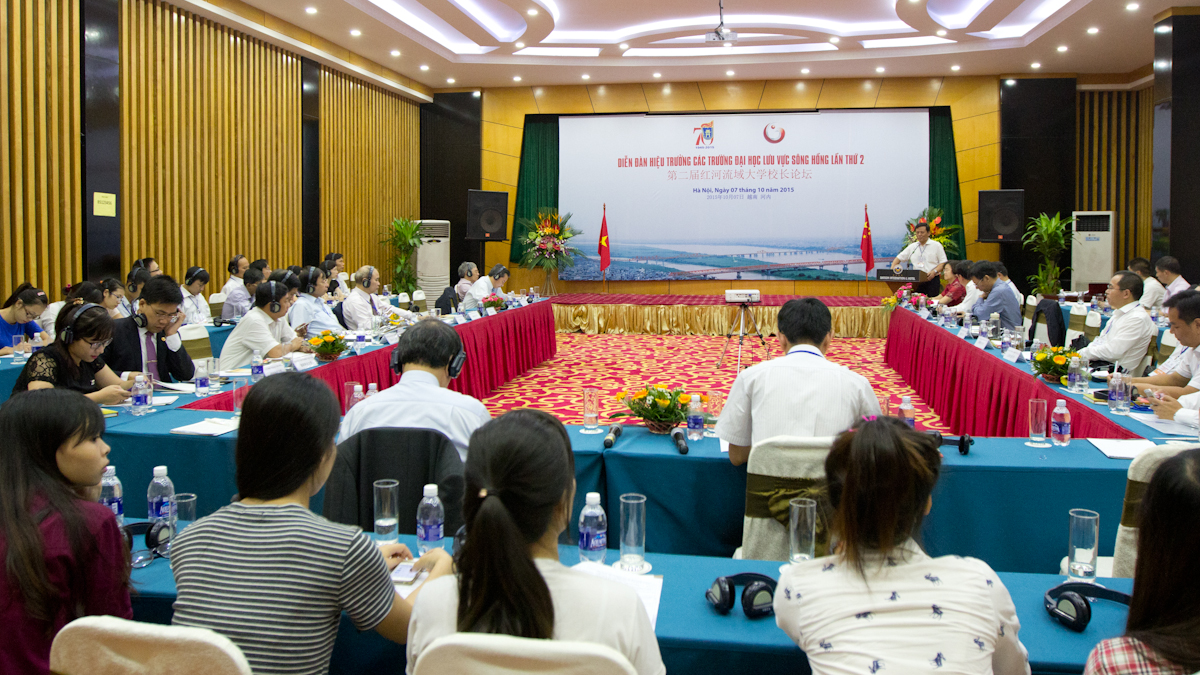
Overview of the afternoon discussion session
Regarding financial issues, schools can exploit national financial resources, with key national topics, such as Vietnam, which has a policy of prioritizing research for the 3 West region, the Yunnan region, the Chinese government also provides a huge amount of funding for ecological environmental research... Besides, research topics can also be linked to local practical activities, transferring research to real life, exploiting funding from investment support sources of local authorities. And orienting to find businesses, socialization is investing in related fields.
Some other issues were also proposed such as sharing scientific research results, exploiting the strengths of the school, and building common scientific research information data.
Author:Phuong Chi
Newer news
Older news